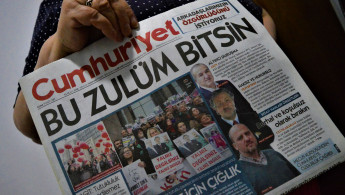Turkey newspaper chief slams journalism case
The chairman of one of Turkey's biggest opposition newspapers denied on Tuesday terror charges levied against staff members, saying it has become a crime to be a journalist in the country.
Akin Atalay, who has been imprisoned for over 500 days, is the only suspect who remains jailed. Sixteen others, mostly journalists, have been released gradually although remain on trial.
The suspects are charged using their coverage to support three organisations that Turkey view as terror groups: the Kurdistan Workers' Party (PKK), the ultra-left Revolutionary People's Liberation Party-Front and the Gulen movement blamed for the 2016 failed coup attempt.
If convicted, they could face sentences of up to 43 years in prison.
Speaking at a courthouse in Silivri outside Istanbul, Atalay denied the charges and accused the prosecutors of "stealing from people's lives".
"I am reading the indictment about us again and again but I cannot understand it," he said.
"The target is clear: take over Cumhuriyet, hand it over to docile hands and give an ultimatum to other newspapers and journalists."
Critics have called the charges absurd and said the trial is political, adding that the outlawed groups themselves cited in the indictment are at odds with each other.
"Journalism is seen as a crime... Are you aware of the danger? Cumhuriyet daily has no other job than journalism and publishing activity," Atalay told the court.
Murat Sabuncu, Cumhuriyet's editor-in-chief and Ahmet Sik, an investigative journalist were released in March pending the conclusion of the trial.
The hearings are expected to continue until Friday before a verdict is announced.
The cases have amplified concerns in Turkey about the rule of law under the state of emergency declared after the failed coup that has seen dozens of journalists arrested.
The P24 press freedom group said there were 153 journalists behind bars in Turkey.
Turkey ranked 155 out of 180 countries listed in the 2017 World Press Freedom index published by Reporters Without Borders (RSF).
Turkey says the crackdown is needed to eradicate the influence of the US-based preacher Fethullah Gulen who it blames for the failed putsch but critics say it has included anyone who dares criticise President Recep Tayyip Erdogan.





 Follow the Middle East's top stories in English at The New Arab on Google News
Follow the Middle East's top stories in English at The New Arab on Google News

![Israeli forces ordered bombed Gaza's Jabalia, ordering residents to leave [Getty]](/sites/default/files/styles/image_330x185/public/2176418030.jpeg?h=a5f2f23a&itok=_YGZaP1z)
